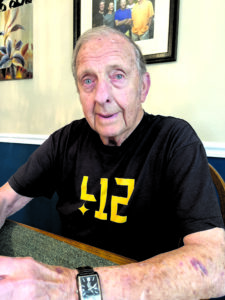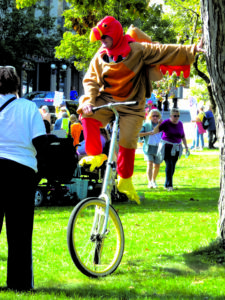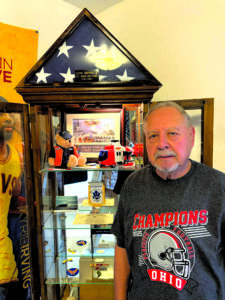Service in Korea boosts veteran’s pride in US

EDITOR’S NOTE: This weekly series highlights local veterans and runs on Mondays through Veterans Day.
STRUTHERS — Robert A. Bruno graduated from Wilson High School in 1948.
In February 1951, he was drafted into the Army and served for two years. He went to basic training at Camp Rucker in Alabama, which had been closed but was reopened at the start of the Korean War.
Bruno didn’t care for Camp Rucker.
“It wasn’t anything like I thought it was going to be. I was in the Deep South, and the town was segregated. I saw various kinds of signs separating colored from white, and it was hard for me to take,” he said.
Bruno said the people training him were all white, as were all his fellow recruits.
“I was from Youngstown, I was used to being with blacks. I grew up with them, went to school with them, and worked in the mill with them. There were blacks in our outfit in Korea, but not at Camp Rucker. That bothered me,” he said.
Bruno was trained to be a combat engineer and worked mainly on explosives including TNT, primer cord and detonators. He was assigned to the 14th Engineer Combat Battalion in a camp in the hills of Korea near the 38th parallel. It was also the place where peace talks were held between the United States and Korea at the end of the war.
During Bruno’s service in the Army, the one thing that he gained above everything else was his appreciation for being an American citizen.
“Korea was filled with rice patties, cardboard shacks and dirt roads. I was exposed to a very primitive type of living. I saw how little they had, and it made me feel grateful to be an American,” he said.
Bruno said the U.S. soldiers were given cigarette rations.
“I was never a big smoker, so I gave my cigarette rations to Koreans who would wash my clothes in exchange,” Bruno said.
He got to know a native Korean who was employed by the U.S. Army and served as the interpreter for their outfit.
“The interpreter came in handy, and we needed his services. Part of our job was maintaining the roads, and the Koreans provided labor. We supervised and the interpreter would explain the orders that came from the Americans,” he said.
Bruno remembers that during the spring, when farmers started their planting, their fieldswere being blown up accidentally by mines that had been put in the fields by the Army.
“Our platoon had to go out into the fields and remove these mines; it was part of our job. We had strict orders not to manually probe mines. If we found a mine, we were told to leave it alone until explosives could be used to blow it up. We used flamethrowers, as the weeds were high, to clear the ground. Then mine detectors were used to determine where the mines were located,” he said.
“One day I was sick, and my sergeant told me to just hang around the camp. The sergeant and I were good friends, we spent time together and were kind of close. When they finished that day, I was told the sergeant was probing mines with his bayonet when one exploded. The sergeant and another soldier were killed. I’m thinking to myself, it might have been me with him if I hadn’t been sick. Or, I might have been able to stop him. I lost a friend, and it was sad,” Bruno said.
He spent nine months in Korea. Because he worked in the minefields, he received hazardous pay of $50 per month, which was in addition to what he earned being in the service.
Bruno said soldiers were given R & R (rest and relaxation) in Tokyo for one week. He recalled how they would return with kimonos and souvenirs for their wives and girlfriends.
“I couldn’t wait for my chance to go. But when it did, the Chinese had pushed into Korea and all R & R was canceled. I never got to go,” he said.
Bruno earned a Korean Service Medal and in 2000, on the 50th anniversary of the outbreak of the Korean War, he received an official document of appreciation from Kim Dae-Jung, president of the Republic of Korea. It thanked him for “his noble contribution to the efforts to safeguard the Republic of Korea and uphold democracy around the world.”
When Bruno was discharged in 1952, he said it felt good.
“I didn’t enjoy the Army because I didn’t like being away from home,” he said.
After being discharged, he returned to Youngstown where he worked at Republic Steel for 33 years, which is where he had worked while in high school and before he was drafted.



